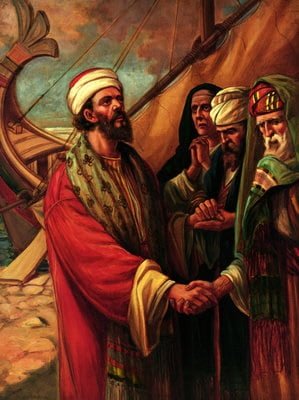Wednesday: Miletus
On his way to Jerusalem, Paul made another stop, this time at Miletus, where he had the opportunity to convey his farewell address to the Ephesian church leaders.
Read Acts 20:15-27. What was Paul’s emphasis in the introductory part of his speech?
Since he had already made plans for a new journey, which included Rome and Spain (Rom. 15:22-29), Paul believed that he would never return to Asia. So, he started his speech with a kind of accountability report of the years spent in Ephesus. Such a report, however, aimed not only at the past, that is, the way he had lived among the Ephesians, but also at the future, for he feared what could happen to him in Jerusalem.
Paul’s fear was not unfounded. The Jerusalem church viewed him with some skepticism, if not hostility, due to his past as persecutor and the circumcision-free gospel he preached (Acts 21:20-26). To the Jewish authorities, he was nothing but a traitor and an apostate from their religious traditions (Acts 23:1-2). By mid-first century, especially on account of Roman misrule, Judea was also gripped by revolutionary and nationalistic ideals. This atmosphere influenced all segments of Jewish society, including possibly the church. In such context, the activities of that former Pharisee among the Gentiles must have made him a figure of notoriety (Acts 21:27-36).
Paul also had more concerns. In Acts 20:28-31, Paul focused on how the church leaders in Ephesus should handle the subject of false teachers, whom he compared to savage wolves who would try to misguide and pervert the flock. So even in the church itself, and even in the earliest days of the church, the danger of false teachers was real. As Solomon said in another time and another context: “There is nothing new under the sun” (Eccles. 1:9, NKJV). A history of the Christian church reveals the incredible damages that false teachers have brought to the church. The problem will exist until the end (2 Tim. 4:3), too.
No question, Paul had a lot of things on his mind, a lot of concerns; and yet, his faithfulness and his diligence never wavered.
| Read 2 Corinthians 4:8-14. What is Paul saying here that we need to apply to ourselves, especially when trials come? Where does Paul put his ultimate hope? |


Where’s Maurice Ashton?
Is he ok?
Hi Shonnie, I’m Ok, but I am on a two month expedition through Northern Australia photographing birds and landscapes. Many of the places are quite remote and connectivity with the Internet very patchy. For example, the last couple of days I was in the Carnarvon Gorge area with no cell phone coverage. Today we travelled 400km, which also takes a toll on writing. During this time we are camping in a 4WD campervan, which is quite a small living space for two people. Thank you for expressing concern, and I will try and post comments when I can.
I too look forward to reading your comments each day Mr. Ashton. Glad you are ok.
I too look forward to your most interesting and helpful comments on our lesson study, but I hope that you find a redwing parrot or a squatter pigeon to enhance your time in Gods beautiful creation in Carnarvon Gorge.
As to why Paul focused on his conduct while first among those whom he was now addressing, it may be he desired them to realize his example in order to pattern their own ministry in like manner, which he had also urged to the Thessalonians(2Thess 3:7,9) and Pilippians(Phil 3:17). A good teacher will practice what they preach, in imitation of Christ Himself.
As then, today there is a great need for watching as many wayward ideas are being brought into the churches which will deceive all but the elect of God. We must make our calling and election sure through unwavering faith, earnest watching, diligent study and prayer without ceasing.
Paul’s benediction is uplifting and worthy of our attention. Notice how the inheritance is “with all them which are sanctified”. As the Revelation describes the faithful, they will “walk in the law of the Lord”(Ps 119:1), “blameless and harmless”(Phil 2:15). Being saved results in the sanctified life while “in this present world”(Titus 2:12). This is the sure result of Christ dwelling “in your hearts by faith”(Eph 3:17).
Paul’s ultimate hope, as ours, can only be in the “exceeding great and precious promises of God” through Christ our redeemer and “Blessed Hope”.
I’m just curious, why does a lot of the book of acts say things like “we traveled” “we were” Acts 20:13 for example, if Luke is saying “Then we went ahead to the ship…” is he with Paul this whole time? I feel like most of the lessons we’ve been reading say Luke is just writing this, not necessarily there? Just a little confused.
Up to Acts 16:9, Luke would refer to Paul and his companions as “they”. But starting in Acts 16:10, Luke starts to use “we”. Perhaps he joined Paul at that point and accompanied him for the rest of the time.